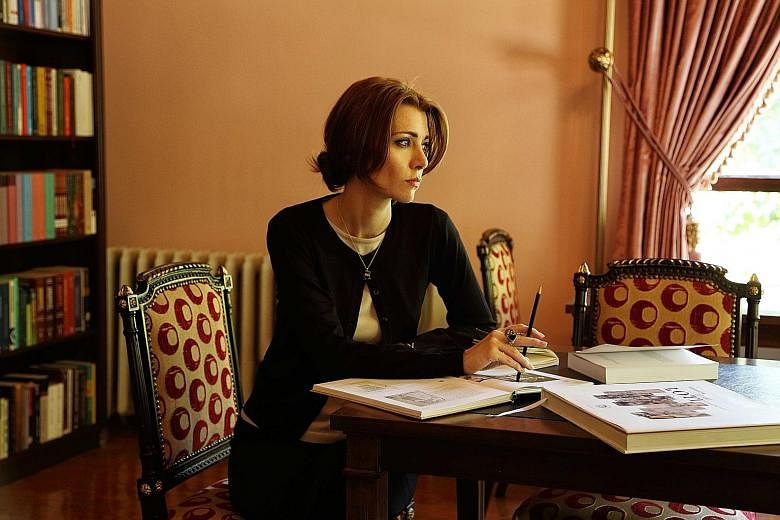The day after Turkish author Elif Shafak landed in Istanbul's Ataturk Airport last June, it was attacked by terrorists.
Had she delayed her flight plans, she would have been caught in the gun and bomb attack, which killed 45 people and injured more than 230.
"The whole incident was surreal," says the 45-year-old, who is the most widely read female writer in Turkey. "It was a horrible kind of cruelty."
Speaking over the telephone from her home in London, she adds: "It is a time when it is difficult to be Turkish. There are 80 million of us, but it is a very lonely feeling."
In the past 11/2 years, Turkey has faced a string of terror attacks, including a bloody nightclub massacre in January that killed 39 and wounded more than 60 as they rang in the new year.
"People feel anything could happen to them, the next week, the next day," says Shafak. "The fear in the air, the uncertainty, that's how terrorism affects people's daily lives."
This miasma of constant dread infuses her 10th novel, Three Daughters Of Eve, which is set, in part, in today's Istanbul.
It was challenging, she says, to write something "so close to the bone".
It is a leap from her last novel, The Architect's Apprentice, which is set in the 16th-century Ottoman Empire.
"It is more risky for a writer to write about present times, with almost no distance.
"But this story has been accumulating inside my soul for such a long time, shaped by what is happening to the Istanbul that I love. It was just a matter of daring to write it."
In the novel, a street assault causes wealthy, frustrated housewife Peri to recall her previous life as a student at Oxford University with her friends - Iranian wild child Shirin and religious Egyptian Mona - as well as their charismatic, controversial theology professor Azur.
The novel swings between Peri's childhood and university years and the lavish dinner party she is attending with her husband against the backdrop of an Istanbul that is ill at ease.
Shafak, who originally wanted to name the novel The Last Supper Of The Turkish Bourgeoisie, satirises the upper echelons of Turkish society, whom she sees as partaking in a kind of "cultural schizophrenia".
"In one moment, people are talking about designer bags and, in the next breath, it's terror attacks and suicide bombs, and then they go back to Bottega Veneta and Chanel. They're very fragmented, very confused."
This sense of rupture extends to Turkey's connection with its past. Shafak has often described it as a "society of collective amnesia".
"Our history is full of not only beauty, but also atrocities, and we must talk of both with an open heart," she says. "But we are never able to talk of the mistakes we made because Turkish nationalism is so strong."
She experienced this in 2006 when she faced up to three years in jail for "insulting Turkishness" in her best-selling novel The Bastard Of Istanbul, which deals with the Armenian genocide at the hands of the Ottoman government.
Shafak, who was eventually acquitted, says Turkey has slid even further into authoritarianism since.
"It has surpassed China as the No. 1 jailer of journalists. Every writer knows at the back of his mind that a poem or novel could get him into trouble easily. There isn't any proper freedom of speech."
It is partly why she divides her time between Istanbul and London, where she lives with her two children, aged 10 and eight. "I love Istanbul deeply, yet I feel suffocated as a writer and a woman.
"I run away, then I go back. I am a person of multiple belongings in my soul."
Shafak led a nomadic childhood with her mother, a diplomat who faced great stigma in Turkey as a young divorcee raising a child alone. As a result, sexual harassment and the oppression of women are themes entrenched in her work.
"Across the Middle East, streets belong to men, public squares belong to men, cities belong to men," says Shafak who, as a young child, witnessed her mother being molested while they were walking in Ankara after sunset.
"Women have to carry safety pins on public transport so they can jab their molesters. We don't talk about it publicly, even though it is a constant fact of our daily lives and the molesters are the ones who should be embarrassed."
She yearns for a sense of sisterhood among women across the Middle East, some way in which they can reconcile the fault lines of faith and feminism.
Her novel explores the conflict among three young women: the atheist Shirin, who is derisive of dogma; the pious Mona, who is critical of Islamophobia; and Peri, who is on the fence.
Shafak declines to say which of the three - the sinner, the believer or the confused - she is. In fact, she points out, they could even be the same woman at different points in her life.
"The point is, these women need to talk to one another. When women are divided into artificial categories, the only thing that benefits is patriarchy.
"We may have differences, but can we not still be sisters? There is so much we need to do together."
•Three Daughters Of Eve is available from Books Kinokuniya at $28.54. See review.


